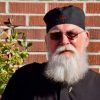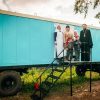Petcu Tudor: First of all, I would like you to talk a little bit about yourself and about your conversion to Orthodoxy, so that our readers discover your personality.
James L. Kelley: I grew up a Protestant in the Church of Christ denomination, which claims to follow the Bible only. The little church I attended with my family was made up mainly of older people who took their faith seriously, who were humble and non-condemnatory toward other Christians. I believe it was through Providence that I was introduced to this version of Christianity instead of the more harsh and less pious groups that I later came to know as a teenager who visited other churches.
When I went to college, I became very disillusioned with Protestantism, which seemed to me a mass of confusion and contradiction. However, even in this relatively agnostic period, I knew somewhere deep inside that Christ was the answer, because, as Dostoevsky said, nothing is more true and more beautiful than Christ, than God becoming man in order to save man. However, I deferred the question of the Church until about 2001, when I was introduced to the writings of the Church Fathers. What a surprise! This was Christ’s true teaching. Christ’s Body is carried forward as a real entity in the Sacraments and in the lives of those worthy to partake of them.
I was received into the Antiochian Orthodox Church here in Norman, Oklahoma, but I soon became a member of the Russian Orthodox Church Abroad. Since, I have attended St. Benedict in Oklahoma City, Oklahoma. My spiritual father is Protopriest Anthony Nelson.
Petcu Tudor: What is the most important change in your life since you have become orthodox?
James L. Kelley: Prayer. Early on, I asked a Serbian friend of mine, “When should we pray?” He replied: “We are Orthodox. We always pray.” The understanding of man, the anthropology of Orthodoxy, is the only one that makes any sense to me. Why should God create a book that, when you read it, imparts infallible truths to you, regardless of whether or not your “filthy unconscious,” as Fr. John Romanides terms it, has been healed? The focus of Orthodoxy is on the purification of the inner man, the nous, through ascesis and through the Holy Sacraments. Only in the context of inner conformity to God can Holy Writ or Holy ceremonies be understood.
It is disheartening to see theologians such as Fr. Nickolaos Loudovikos see in Fr. John Romanides’ theology a de-emphasis on the Sacraments. What does it mean to emphasize the Sacraments? Are we saved through a turnstile, or a pez dispenser, a mechanism that counts whether or not we went to church? No, a Sacrament confers on the seeker the level of union with divine energies that he or she has worked for. And, of course, the participation in the Sacrament is itself a purifying work, so there is not, and cannot, be any contradiction between Fr. John’s emphasis on the Liturgy that has to take place in the inner man, and life in the Church’s Sacraments. Anyone who perceives an opposition there is projecting their own error onto a holy man’s writings.
So, why all the confusion and misconception about Sacraments and their relation to the inner life? I think human beings can became deluded by an overwhelming desire for a universal anchor that seems tangible and real as if it were a loaf of bread inside a room whose door we have a key. Being accessible to our eyes, hands, and mouths, and being separable by its enclosure, we understand this bread, this object out there, from our all-knowing perspective, our Punctum Archimedis, as an object of experience of which we have certain knowledge.
I think this is where Greek philosophy started: What is the unchanging, unmovable foundation for the world? It must be a kind of Being that serves as an absolutely unchanging background for all change. “All that is, is; all that is not, is not,” as Parmenides said. So, as the self-appointed “lover of wisdom,” the philosopher, one can now grant legitimacy to whatever aspects of the world that seem more solid and immutable, and discount what seem to be the more ephemeral aspects. The philosopher looks with eyes such as these at institutions and confers his imprimatur on them (with reservations of course), and holds himself back as the gifted one in possession of knowledge of Being.
Orthodoxy does not start with an aristocrat who assumes that his noetic apparatus, his mind, unaided by God, can determine what is immutable and what is mutable. Orthodoxy starts with despair: God is uncreated, I am created and mutable. I am lost without being saved, for creation is pain, limitation, death. Creation is an open sore that cannot close its own breach; it can grasp no m?teria outside its own aching, screaming life. If we attend to ourselves, we find our inner man telling us that the question of creation (who will deliver me from the body of this death?) has to come from both outside of creation and inside of creation. So there must be revelation.
This is how Christ came to man before the Incarnation: men despaired of their own corruption and the Angel of Great Council visited them in their nouses, performing the Divine Liturgy there, pouring out the Holy Spirit therein. This is why St. John the Forerunner recognized Jesus as the Christ: his nous was already co-performing the Liturgy with God the Father through the Son in the Spirit (though in anticipation of Christ’s full promise, later fulfilled in the Church, which rolls backwards and forwards to save all of human nature, though every man must willingly take on this salvation, as St. Maximos and others stress).
So, Orthodoxy starts with the human being who realizes that his inner man needs to be purified. Orthodoxy begins, persists, and ends with the purified nous, where God and the Liturgy are experienced directly by man. Philosophy sets out with a man of earthly influence (or, at least, a man who thinks he is able to discern the ordering principles in the cosmos and bend society towards this order) who is inspired by a bad spirit to project onto human institutions his sense of elation over his own will-to-power and to call the whole mess “physis,” or “nature.”
Theologians and political scientists usually cling to one or another notion of natural law because they subconsciously believe more in their own capacity to control and manipulate their environment than in their destiny to be a co-enactor of divine energies. What is the roadmap for doing the latter? The lives of the saints and the life in the Church. But we are all tempted to rely more on norms, rules, and precepts than on the tears and despair of the Psalmist. Am I suggesting spiritual anarchy, as if the spiritual life was not guided by commandments set down in sacred writings, rites, and logoi of spiritual guides? God forbid!
But, as Fr. John says, words are a guide to a state where words are replaced by the thing signified by the words. Instead of what Fr. John and the Patristic writers offer, people seem to want a Constitution and a Bill of Rights of the Church, a maximum-minimum plan that allows nominal membership in the Body of Christ. People think they want what Dostoevsky’s Grand Inquisitor offers, and they justify it in terms of the weakness of the masses, those benighted ones who will not reach illumination and glorification unless we get them saved. All the while, the will-to-power is operationalized to herd people into buildings for their own good, so give them an existential minimum of Orthodoxy. The quantitative is often invoked: well, do we see people becoming saints around us? No, it does not happen, at least as far as we can see with our unaided vision.
But it takes one to know one, so the question arcs back to the qualitative: are we becoming like Christ? And I do not mean moralism here, I mean are we purifying the nous so that the Liturgy is co-performed by us there? As St. Paul said, “I want you all to be perfected,” that is, to go beyond words, to experience God directly. Otherwise, our faith is a mere social institution, a club full of people clutching to baptismal certificates.
I can just hear Fr. Nicholaos and others calling this “guruism” and “rigorism.” “We need the objective institution of the Church to counterbalance our inner convictions,” they will say. The truth is, human beings want to evade the decision at all costs, they want to replace the responsibility to cry out in the barrenness of the cold night with the warm, cosy interior of a system of norms, of a neutral domain that promises results through a mechanism. We hide the ugly gears of this mechanism from ourselves, like the philosopher who elides the mind-numbing redundancy of “A=A” behind a torrent of high-sounding words. This is legalism, this is something that we can control and thus something that we can be controlled by. As Heraclitus said, “Nature loves to hide,” and we love to bow down to laws broad and diffuse enough to encompass all of space and time. The Other is totalized inside our philosophical system as being always already bound to the law that we have come to know, and so our choice to bind ourselves anoints us as chosen beings, as that noble tribe, the lovers of cosmic order, the philosophers. And we have in this way, contra Levinas, made all others hostage inside our iron grid.
The Church is the Body of Christ. It is Sacraments, it is the Lives of the Saints, and, as such, it is the life of each every Orthodox Christian, which is only Orthodox inasmuch as it is saintly, holy, and thus Sacramental. Do I de-emphasize the Holy Sacraments by saying, along with Fr. John, that Sacraments exist so that we become consciously yet ineffably united to the Holy Trinity’s energies? God forbid.
Petcu Tudor: Do you think that the Orthodox Church could be considered a some kind of hospital for wounded souls?
James L. Kelley: In the pagan clinics of the ancient Greeks we find the Asclepian physicians, who treated the whole man (as they understood him), inner and outer. Treatments in the Asclepian system might include sleeping beside a pure natural spring, or having your physician take medicine for you, so that he might receive a revelation in a dream that will reveal a holistic cure, one that encompasses the body, the conscious mind, and the unconscious depths of the mind. Orthodoxy is holistic in this latter sense, treating the whole man by guiding the whole man to another mode of existence, not just by giving him a potion as doctors do in Western medicine nowadays. Though the cure is facilitated in the life of the Church, it requires an inner cooperation, an inner assimilation of the divine, which is the only medicine that can truly heal man from his depths.
Petcu Tudor: Please describe in some words how does the orthodox life in your country look like.
James L. Kelley: It is an oasis of sorts. Monasticism, where it exists, is like an orchid that needs a lot of outside tending in order to support itself. Weaving baskets all day is just not going to keep the electricity on in today’s monastery. Plus, the expense of buying a piece of land, paying taxes on it every year, building a structure to house the monks: all of this is outside the means of a lot of jurisdictions over here, and there just is not a lot of emphasis placed upon monasticism here. This could change, but how and when I do not know. I cannot make any generalizations about the quality of parish life. I only know that at my parish there is a high level of commitment to living the Orthodox life in spite of countless distractions that intrude from the outside.
Petcu Tudor: Do you think that the Western Orthodoxy could flourish in the future and if so, how?
James L. Kelley: Western democracy prides itself on its tolerance of all forms of life, but in practice it opposes any view of life that questions its own relativism. To question the transience of all values is to be intolerant according to today’s mindset. But, as I am fond of repeating, the only real measure of tolerance is this: how tolerant are you of intolerance? No political group passes this test, and so conflict between groups is inevitable, if only as a boundary that marks off different existential modes of life. How can Orthodoxy flourish in Western democracy? By not confusing it goal of transcendence, of illumination of the nous, from political goals set up by man. The political is provisional, though relatively connected to providence. We are not Protestants, so we do not see the world as a shadowy theater whose power plays have no connection to spiritual realities (some Protestants would agree with us on this, though). However, we are also not phyletists, we do not think God smiles more on one ethnos than another, simply because of their birthright. Orthodoxy is the cure of the soul, but it indirectly reveals what the political is, by casting light upon what it is not.
Petcu Tudor: Given that you are a convert to Orthodoxy how can Orthodoxy in your opinion become a way of living? Not least, which would be your testimony for the heterodox individuals who intend to explore more the Orthodox horizon?
James L. Kelley: Orthodoxy is based upon obedience, but obedience is precisely what modernity hates. Orthodoxy does not become a way of life by electing Greek congressmen or by going to seminary, primarily. It is always easier to think about broad social changes and sweeping programs than to pay attention to the simple assignments given to you by your spiritual father. Do we take their words as if they came from Christ Himself? Do we conscientiously follow these words from moment to moment? This is inner purification, and this is the only real gauge for the “Orthodox life.” Incidentally, purification of the nous can only be seen by God and by those who are becoming purified. It is all a silly waste of time from the world’s perspective.
Petcu Tudor: In your opinion which Orthodox thinkers or representatives have contributed most to the evolution of Orthodoxy in the Western societies?
James L. Kelley: Fr. Georges Florovsky and his student, Fr. John Romanides have been an example of the Orthodox mind at work in the West, but there are countless others. Spiritual children of St. Sophrony of Essex keep in close contact with the Antiochian monastery in Wichita, Kansas, so there is high quality of spiritual life within the walls of their monastery, which I have visited myself. Thank you for this opportunity to speak about Orthodoxy to your God-beloved country. In the name of the Father, and of the Son, and of the Holy Spirit, Amen.

















